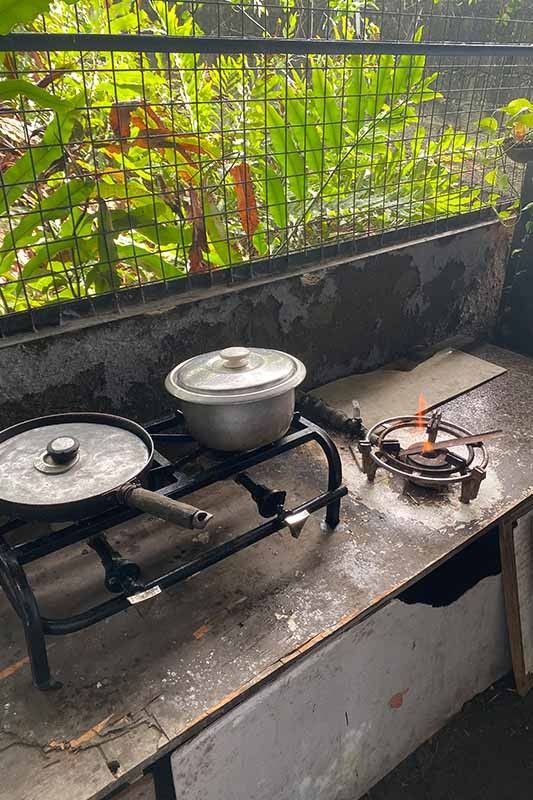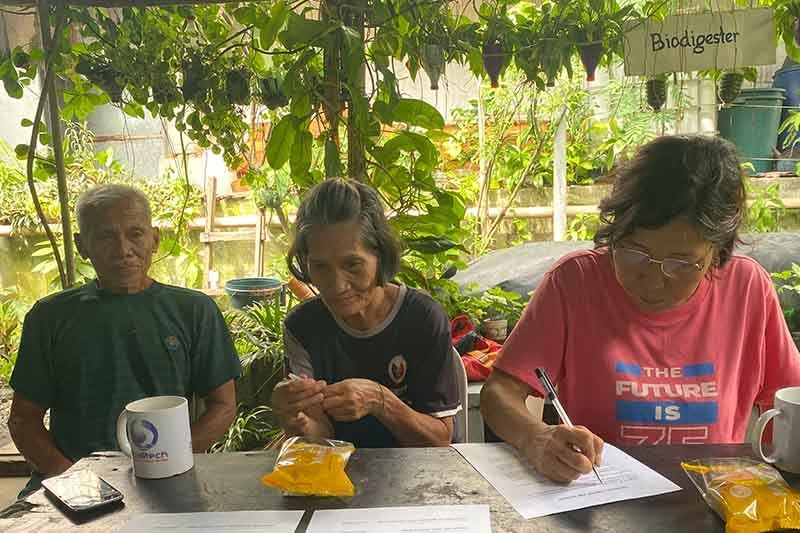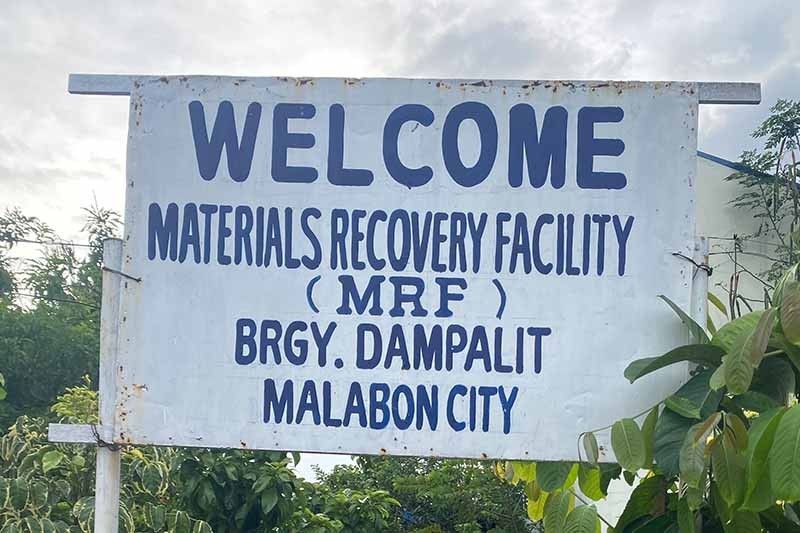Better conditions sought for Malabon waste workers leading clean energy initiative

MANILA, Philippines — In recent years, Barangay Dampalit in Malabon City has made strides towards producing renewable energy (RE) from their solid waste.
It is home to a biodigester, which transforms organic waste such as food scraps and animal waste into biogas through the natural process of decomposition in an oxygen-free environment. This biogas is used by workers of the barangay’s Materials Recovery Facility (MRF) for cooking, and is also available for communal use–free of charge.
The barangay also owns a dual drum decomposer, used to churn down organic wastes to produce soil. This soil–combined with “biol,” a nitrogen-rich soil enhancer–is then sold for P20 per kilo.

Because of these practices, students and clean energy organizations regularly visit Barangay Dampalit’s MRF, which houses the biodigester and dual drum decomposer.
Dampalit’s initiatives are part of the Philippines’ transition to low-carbon energy, mandated since the implementation of Renewable Energy Act 15 years ago. The government targets RE to comprise 35% of the power generation mix by 2030 and 50% by 2040.
Yet behind these milestones are the unseen waste workers who, despite low pay and safety hazards, help the country inch towards its RE goals.
Buckets to fill

Blanca Esplana, 56, is among the 20 waste collectors in Barangay Dampalit. Daily, she collects the garbage of 13,000 residents—from PET (polyethylene terephthalate) bottles, food scraps, cardboards, and pet wastes. They enforce the barangay’s “No Segregation, No Collection” policy, which has been in place since 2018.
By 5 a.m., Esplana and her 71-year-old partner Flaviano Romero, also a barangay waste worker, ride a tiny pedicab to collect household wastes. Collecting and segregating waste in the MRF takes about four hours. After this, they clean and maintain the MRF for the rest of the day.
All this work is worth P100 daily, Esplana said.
Dampalit’s waste workers thus receive a monthly salary of P3,000 (around USD 52), which they receive in two tranches every 15th and 30th day of the month, according to 54-year-old Catherine Gutierrez, monitoring officer of the barangay MRF.
Budgeting this meager salary for her daily expenses is a challenge for Esplana, who is the sole breadwinner of a family of six.
“Mahirap talaga ma’am kasi yung sinasahod namin kulang talaga ‘yun sa pang-araw araw lalo na ngayon mahal ang bigas, mahal ang ulam. ‘Yung isang daan di talaga aabot ng maghapon po ‘yun ‘saka halimbawa, may anak ka pa, mas lalong hindi talaga,” she said.
(It’s hard for us to manage our salary because it isn’t enough for everyday expenses, especially these days where rice and meals have gotten more expensive. P100 would not last a whole afternoon. And if you have a child? It definitely won’t suffice.)
Esplana says that she also gets sick at least twice a month, mostly due to dehydration from her work. Despite the health risks, they do not receive any hazard pay, according to both Esplana and Romero. Often, they depend on solicitations or financial help from barangay officials for medical assistance.
A loophole

Gutierrez and Esplana are “job order” employees of the barangay, which means they are not entitled to any other employment benefits aside from their wages.
The barangay waste workers are also “coterminous” with barangay officials, meaning their work ends once the officers’ terms end. Fortunately for Esplana, Gutierrez, and Romero they managed to retain their jobs at the MRF after the election of a new set of officials in Barangay Dampalit.
MRFs, such as the one in Barangay Dampalit, are established under Section 32 of the Ecological Solid Waste Management (ESWM) Act of 2000. These facilities are regulated by local government units. However, provisions on employment and compensation of waste workers are not specified in the law.
According to a 2021 study by the Philippine Institute for Development Studies (PIDS), funding for barangay MRFs are dependent on city and municipal funds.
“Although much responsibility was expected from the barangay level, limitations in resources made them dependent on municipal initiatives,” the PIDS study observed. “This resource inequity and LGU dependence need to be rectified if localities are to see more effective and responsive collection and material segregation systems."
The writer of this article repeatedly sought the Malabon City Environment and Natural Resources Office and Barangay Dampalit’s officials for comment on this matter, but they have yet to respond as of this writing.
Focusing on a just transition
Economist and former president of Freedom From Debt Coalition (FDC) Maria Teresa Diokno emphasized that a “just transition” to a greener economy should “focus a lot” on informal workers. She pointed out that the changes should be inclusive and not displace workers, providing them instead with more sustainable work opportunities.
“They should be at the center of a just transition because the nature of their employment tends to be insecure and precarious, because they are grossly underpaid, and because they have no social protection,” Diokno said.
Most waste workers in Barangay Dampalit are also advanced in age. They said that barangay officials employed them out of compassion as no one would hire them due to their age.
“Informal workers rarely choose to be informally employed. The reality is, the formal market has no place for them.” Diokno added.
According to her, creating safe jobs equipped with training and decent pay must target informal workers. It should also not be limited to work opportunities but skills training and development centered on enterprises for them to run and earn profitably and sustainably without doing harm to the environment.
In spite of these conditions, Barangay Dampalit’s waste workers consider the importance of what they do not only as a thread of hope to sustain their families but a commitment to the community as well.
“Concern ko talaga ang mga waste, (ito) ang advocacy namin kaya hinawakan ko, kaya itutuloy ko itong MRF para mabuhay,” Gutierrez said.
(Waste has been my concern and advocacy, that is why I’m working in the MRF. I will also continue working in the MRF to live)
They also hope that their story would find its way to the right ears and spark some changes.
"Pinakamababa kami sa lahat, wala kaming boses. Ang hiling ko lang din sana ay mabigyan naman ng panahon na kaming mga waste workers ay mabigyan din ng patas na sweldo para sa ginagawa namin–para sa sakripisyo din namin," Gutierrez said.
(We are the lowest, we don’t have a voice. My only wish is for an opportunity to come by where we could earn an equitable salary for the work that we do—at the very least, for our own sacrifices)
--
This story was supported by Climate Tracker Asia and the U.S. Embassy in the Philippines.
- Latest

























